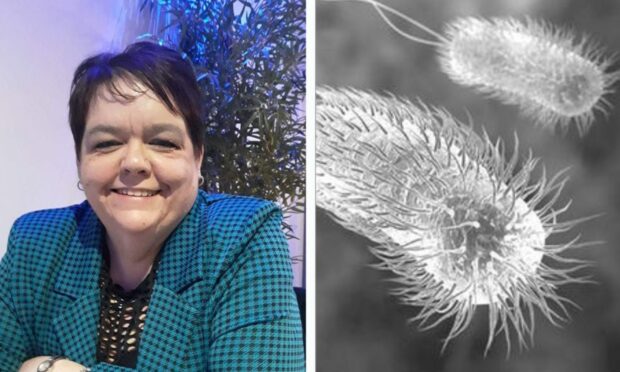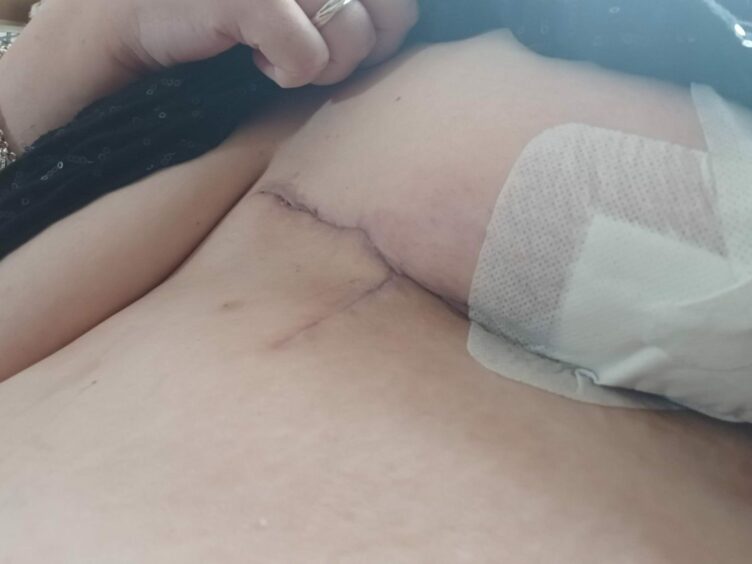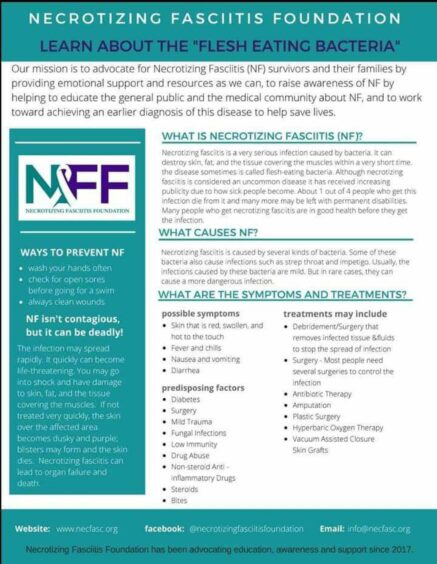A Shetland woman has opened up about her experience of a flesh-eating disease in a bid to save lives.
Sylvia Halcrow, 52, discovered an abscess on her breast last year and just five days later was in a coma fighting for her life.
The Lerwick resident believes the underwire of her bra rubbing against the abscess led to necrotising fasciitis, a serious bacterial infection.
She originally feared she had cancer when she discovered a hard lump under her right breast in April 2022.
As it became more painful over a few days, she went to her local GP to be examined and was “relieved” to be told it was an abscess.
However, the pain quickly escalated and Miss Halcrow ended up being admitted to Gilbert Bain Hospital.
“I was in absolute agony,” she said.
“The abscess kept bursting with black stuff coming out of it and it smelt awful – like death.
“I went to A&E and was ushered into a treatment room straight away. They could see the pain I was in.
“As the day progressed, nothing was helping and I started to see a red line going up my boob. It was hot to touch and red. They tried to extract fluid but nothing could come out.”
Eight-day coma
The decision was then made to take Miss Halcrow to theatre to make her more comfortable.
She went to sleep in Lerwick on the Wednesday evening and woke up in Aberdeen Royal Infirmary the following Friday.
“My brain was still thinking I was in Shetland but I was thinking ‘why is nobody here?’,” she said.
“I phoned one of my friends and she was so relieved to hear me. She told me I was in Aberdeen and I thought ‘what has happened to me’?
“I had a terrible pain in my leg when I woke up and I thought I’d been swimming in the sea and had been bitten by a shark. That is what I was most concerned about. The feeling I had been in the water felt so real, they call it delirium.”
‘It has been quite traumatic’
Miss Halcrow had been transported to Aberdeen by helicopter and kept in a coma after surgeons discovered the necrotising fasciitis.
She believes her bra rubbing against the abscess caused a wound to form, which allowed the disease to get into her system.
“The nurse said they had to take me to theatre to try and remove a bug that was eating my flesh and had to keep the wound open,” she added.
“It was safer for me to be asleep this whole time to make sure they got everything.
“I have a scar from the top of my rib cage to under my right armpit. A third of my breast had to be removed including some of the good flesh to make sure there is a margin.”
Miss Halcrow spent three weeks in Aberdeen, during which her kidneys started to fail and she had to receive three rounds of dialysis, including two while unconscious.
She then spent the next four months recovering at home and was able to return to work at the end of September last year.
Now she hopes raising awareness of her experience can help others.
“I’m grateful that I am here to tell the story because it became very close to me not being here,” she said.
“It has been quite traumatic but I’ve seen other people who are still getting surgery seven years later. So, the fact I was off four months, as bad as it was, I feel very blessed.
“On a bad day, I walk with a limp due to the nerve pain caused by being in the same position for a week, but I’m 90% back to normal now.”
Spreading awareness of necrotising fasciitis
Miss Halcrow has received support from a survivors’ group on Facebook and the Lee Spark Foundation which aims to spread awareness of necrotising fasciitis.
She has raised £2,000 for the charity through donations given at sheep sales, where she works with farmers and crofters for the Scottish Government.
“There’s no substitute for someone going through the same as you,” she said.
“It leaves a mental trauma, which is just as difficult as the physical stuff. People are joining every day for the support.
“It’s such an awful thing to get, it’s certainly the scariest thing I’ve ever gone through, so that community is very important.
“And, I now want to spread that awareness too – necrotising fasciitis has got such a low survival rate, I think the current statistic is 40%, and you’ll often have it before you even realise. It’s difficult to get on top of it because it’s very fast acting.
“If you think something isn’t right, get yourself to the doctor. If you scratch yourself, no matter how small, make sure you clean it.
“Even if I can save one person, then I think I’ve done my job.”



